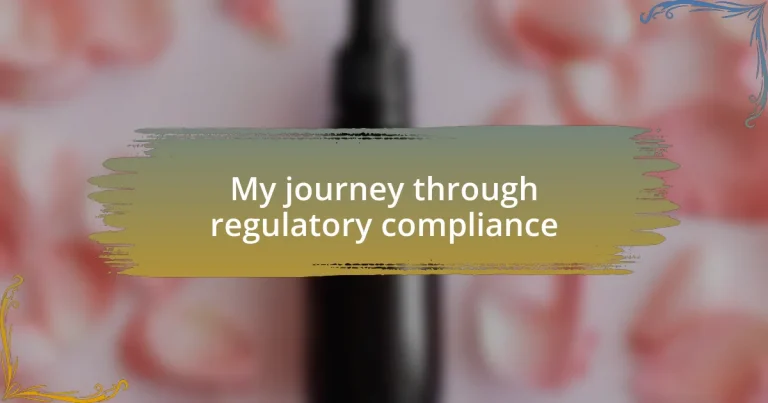Key takeaways:
- Regulatory compliance is crucial for consumer safety and fostering a trustworthy business environment.
- Adaptive strategies and collaboration among team members can transform compliance challenges into opportunities for innovation.
- Regular training and leveraging technology enhance compliance effectiveness and streamline operations.
- Celebrating small victories in compliance fosters team motivation and a positive organizational culture.
Author: Clara Whitmore
Bio: Clara Whitmore is an acclaimed author and storyteller known for her captivating narratives and richly drawn characters. Her work spans several genres, including contemporary fiction and historical romance, often weaving elements of personal experience into her writing. Clara holds a Master’s degree in Creative Writing from the University of Edinburgh and has published three novels, which have garnered critical acclaim and a loyal readership. When she’s not writing, Clara enjoys exploring quaint bookstores and hosting literary workshops. She currently resides in Portland, Oregon, with her dog, Jasper.
Understanding regulatory compliance
Regulatory compliance is the process of adhering to laws, regulations, and guidelines overseeing industries, including alcohol sales and distribution. From my experience navigating these complexities, I often found myself questioning, how do all these rules really protect consumers while still allowing businesses to thrive? It’s fascinating to see how compliance isn’t just about ticking boxes; it’s about fostering a safe environment for everyone involved.
When I first delved into the world of compliance, I vividly recall the frustration of deciphering dense regulations. It felt overwhelming at times, almost like trying to solve a puzzle where some pieces were missing. This journey made me appreciate the importance of having clear guidelines – they serve as a roadmap, guiding businesses and protecting consumers alike. Have you ever considered how much trust we place in the businesses we frequent? Compliance plays a crucial role in upholding that trust.
Different jurisdictions have unique regulations, which can sometimes lead to unexpected challenges for those in the alcohol industry. For instance, I once had to adjust our marketing strategy due to newfound regulations in a specific state. It was a valuable learning moment, illustrating that while compliance can feel restrictive, it often leads to innovation. Isn’t it intriguing how challenges can spark creativity and growth in the most unexpected ways?
Importance of alcohol regulation
When I think about the importance of alcohol regulation, it strikes me how these rules serve as a protective shield for consumers. I remember attending a seminar where a representative from a regulatory body shared stories of people whose lives were impacted by unsafe practices in alcohol production. It was a stark reminder that regulations are essential not only for compliance but also for ensuring our safety. How often do we take for granted that the beverages we enjoy have been vetted for quality?
Moreover, these regulations play a pivotal role in leveling the playing field among businesses. In my early days in the industry, I witnessed smaller producers struggle to compete against larger entities that could easily skirt regulations. When strict compliance measures were implemented, I saw a shift that allowed for fair competition. Isn’t it fascinating how regulations can empower those who might otherwise be overlooked?
Lastly, I can’t help but reflect on the social responsibilities intertwined with alcohol regulation. During a community meeting I attended, discussions around responsible drinking initiatives highlighted how regulations encourage manufacturers to promote safer consumption. This focus on public health is so necessary, isn’t it? It reminds us that, at the end of the day, regulations extend beyond the bottom line—they’re about nurturing a culture of responsibility that benefits everyone.
Overview of compliance requirements
Understanding compliance requirements in the alcohol industry is critical. From my experience, navigating these regulations can feel overwhelming at times. Each region has its specific mandates, which means that our operations must align with local laws just to operate legally. Have you ever considered how many licenses and permits a business must secure before opening its doors? It’s quite a number!
In my early days working with a local brewery, I recall the daunting paperwork that felt never-ending. We had to ensure compliance with health standards, labeling laws, and sales regulations—not to mention the taxes we had to navigate. I remember feeling a mix of anxiety and determination as we worked through the complexities of each requirement. It was a test of our commitment to doing things the right way, but ultimately a foundation for our reputation.
One aspect of compliance that often gets overlooked is the importance of record-keeping. I learned this the hard way during an audit; having precise records not only legitimizes your business but can save you from hefty fines. This experience taught me that compliance isn’t just about following the rules; it’s about fostering a culture of transparency and accountability within an organization. How can we expect consumers to trust us if we don’t even trust ourselves to stay compliant?
Challenges in alcohol compliance
Compliance in the alcohol industry brings its own set of challenges, and I’ve experienced firsthand how intricate it can be. An example that stands out was when our team misinterpreted a labeling regulation, leading to a public relations nightmare. Can you imagine the stress of having to recall a product due to non-compliance? It’s a stark reminder of how vigilant we need to be with even the smallest of details.
Another hurdle I faced involved the differing state laws regarding distribution. When attempting to expand our reach, I learned that what was permissible in one state may not be in another. Navigating those regulations felt like treading through a maze, often leaving me questioning whether we should take the risks or play it safe. Have you ever had to weigh potential growth against compliance headaches? It’s a tough spot to be in.
Finally, the dynamic nature of alcohol laws can be quite daunting. Just when I thought I had a solid understanding, a new law would emerge, jolting our compliance strategies. I vividly remember the anxiety that accompanied these changes; it felt like reinventing the wheel on a regular basis. How do businesses adapt without losing their footing? It’s a delicate balance that requires constant learning and flexibility.
Strategies for effective compliance
To navigate the complex landscape of regulatory compliance, a proactive approach is essential. I found that establishing a robust internal compliance team made a significant difference in our operations. With dedicated members focusing on regulatory updates, we could swiftly respond to changes without missing a beat. Have you ever witnessed how a small team can impact an entire organization’s compliance culture? It truly reinforces the idea that doing it right starts with having the right people.
Regular training sessions for all staff involved has been another cornerstone of our compliance strategy. I can still recall a team meeting where we had a deep dive into labeling laws; it was enlightening to see everyone’s engagement and understanding grow. That level of education not only minimizes errors but also fosters a sense of ownership in maintaining compliance. How great would it feel if every employee felt empowered to take compliance seriously as part of their daily tasks?
Finally, I’ve learned that leveraging technology is a game-changer for effective compliance. Implementing specialized software to track regulatory changes and manage documentation has streamlined our processes remarkably. There was a time when we’d scramble to gather paperwork during an audit, creating unnecessary stress. Now, everything’s at our fingertips, allowing us to focus on what truly matters: building our brand. Does it make you think about how technology could transform your own compliance practices?
My personal compliance experience
It’s fascinating how my journey through compliance began almost by accident. I stumbled into a compliance role during a particularly challenging period for our organization. Instead of feeling overwhelmed, I discovered that each regulatory shift offered a chance to innovate. How could something as daunting as compliance turn into a source of motivation? For me, it became about shaping a culture of accountability rather than just ticking boxes.
One incident that stands out was during an unexpected regulatory inspection. I remember the tension in the air, my heart racing as we prepped for the auditors. Ultimately, I realized that our thorough documentation and the team’s hard work paid off. That day reinforced my belief in the importance of diligence. Have you ever felt that rush of adrenaline when your preparation meets an opportunity?
As I reflect on my compliance experience, I realize how crucial clear communication has been. There was a particular moment when I facilitated a company-wide discussion on compliance changes, and it was incredible to see everyone’s eyes light up with understanding. It reaffirmed how vital it is to translate complex regulations into everyday language. Isn’t it amazing how a shared commitment can turn a mundane topic into a driving force for success?
Lessons learned from my journey
One of the most significant lessons I learned was the power of adaptability. When faced with sudden changes in regulations, instead of panicking, I focused on re-evaluating our processes. I distinctly recall a situation where we had to pivot our marketing strategies overnight due to new guidelines. That experience taught me the value of being flexible and how quickly shifting our approach could turn potential setbacks into opportunities for creativity.
Collaboration emerged as another key takeaway. Early in my journey, I often attempted to tackle compliance issues alone, believing I had to shoulder that responsibility. It wasn’t until I engaged in consistent dialogues with my colleagues that I noticed the breadth of perspectives and insights we collectively possessed. I remember a brainstorming session where everyone contributed ideas, and we identified solutions that I would have never considered on my own. Isn’t it fascinating how teamwork can uncover insights that an individual might overlook?
Finally, I discovered the importance of celebrating small victories. During one of our compliance audits, we met all the required regulations ahead of schedule. Instead of viewing compliance as a mere obligation, I initiated a small gathering to acknowledge our team’s hard work. Witnessing everyone’s faces light up with pride reminded me that even the routine aspects of our job could foster a sense of accomplishment. Have you ever paused to reflect on the small wins in your own journey? Those moments often hold the key to sustaining motivation.


